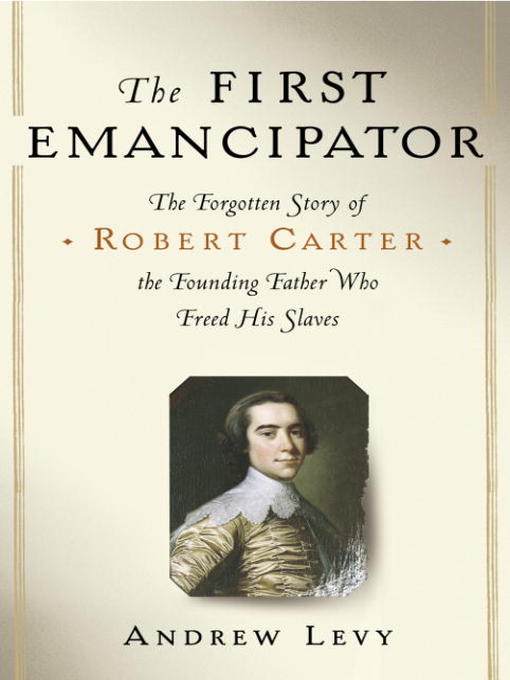
The First Emancipator
The Forgotten Story of Robert Carter, the Founding Father Who Freed His Slaves
کتاب های مرتبط
- اطلاعات
- نقد و بررسی
- دیدگاه کاربران
نقد و بررسی

Starred review from April 4, 2005
On the most fundamental level, this work can be seen as an exploration of the "'gross imbalance' between promise and execution" that characterizes American culture. We hold the loftiest ideals of freedom and progress ("liberty and justice for all"; "no child left behind"), argues Levy, but more often than not, these ideals fall flat in practice. Levy presents a painstakingly rich portrait of an American who overcame this imbalance: Robert Carter. A contemporary of Jefferson and Washington, Carter has largely been forgotten by historians because he seems less heroic than these great men; nevertheless, he managed to do something that they and the other founding fathers-for all their greatness-could not: free his slaves with little or no material gain. In so doing, Levy argues, Carter provides an example of an unsung American hero: no tragic flaw of moral failing to set the glow of his great deeds in sharper relief, no titanic struggle on the stage of national politics to realize his ideals, simply a thoughtful man pushing himself in moments of private reflection to rid himself of the moral contradictions of his time. Levy does a wonderful job bringing Carter to life from the somewhat wooden written remains of his account ledgers, business journals and letters, reminding readers just how peculiar his life and his choices were by setting them in the context of the other great Virginians of his time. This well-written and thoroughly engaging book will certainly appeal to readers interested in the history of 18th- and 19th-century Virginia, but also to those interested in the history of slavery and racism in America and in historical biography.

Starred review from May 1, 2005
Levy ("The Culture and Commerce of the American Short Story") examines the unique life of Robert Carter III, one of the wealthiest men in 18th-century America, and his monumental "Deed of Gift." This legal document, recorded in 1791, allowed for the largest single emancipation of slaves until the Emancipation Proclamation. The deed was not only revolutionary; it was practical and worked remarkably well. Carter employed a system of gradual emancipation, relying on his wealth, lawyers, and agents to accomplish his goal despite strong opposition from family, neighbors, and local officials. Levy looks at Carter's controversial and colorful life (he was fond of naming his plantations after Zodiac signs) and why the deed has been largely forgotten. He also traces Carter's spiritual evolution -from traditional Episcopalian to radical Baptist reformer to Swedenborgian -and how it impacted his views on slavery. A truly remarkable story about an eccentric American hero and visionary who deserves widespread attention, this engaging and well-researched book should be standard reading for anyone with an interest in American history. Highly recommended for both public and academic libraries. -Robert Flatley, Kutztown Univ. of Pennsylvania Lib.
Copyright 2005 Library Journal, LLC Used with permission.

Starred review from April 15, 2005
In 1791, at a time when the nation's leaders were fervently debating the contradiction of slavery in a newly independent nation, wealthy Virginia plantation owner Robert Carter III freed more than 450 slaves. It was to be the largest emancipation until the Emancipation Proclamation, signed by Abraham Lincoln. Levy offers an absorbing look at the philosophical and religious debate and the political and family struggles in which Carter engaged for years before very deliberately and systematically freeing his slaves as he attempted to provide a model for others to follow. Drawing on historic documents, including Carter's letters and painstakingly detailed accounts of plantation activities, Levy conveys the strongly held beliefs that drove Carter through the political and religious fervor of the time to arrive at a decision at odds with those of other prominent leaders and slaveholders of the time, including George Washington and Thomas Jefferson. Levy offers a fascinating look at one man's redemption and his eventual lapse into historical obscurity despite his incredibly bold actions. Well researched and thoroughly fascinating, this forgotten history will appeal to readers interested in the complexities of American slavery.(Reprinted with permission of Booklist, copyright 2005, American Library Association.)

























دیدگاه کاربران